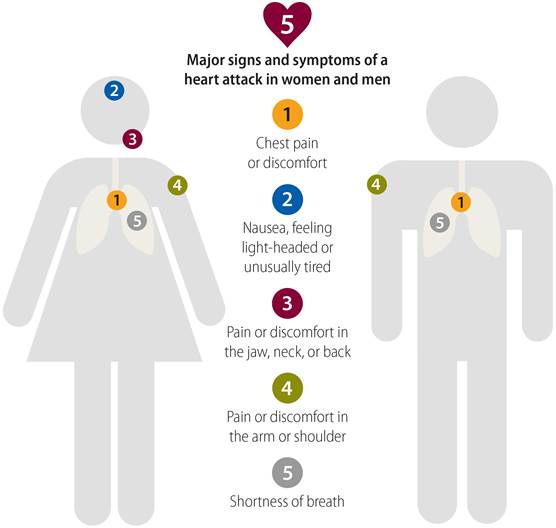Get News & Updates Directly To Your Inbox


Get News & Updates Directly To Your Inbox

Find A Doctor Or Hospital In Your Network.
 Heart disease and stroke are the first and fifth leading causes of death in the United States, according to the U.S. Department of Health and Human Services.
Heart disease and stroke are the first and fifth leading causes of death in the United States, according to the U.S. Department of Health and Human Services.Each year, about 1.5 million Americans suffer a heart attack or stroke. More than 700,000 of them die.
The good news is that many heart attacks and strokes can be prevented. The right lifestyle changes can significantly lower your risk.
That’s why DHHS, the Centers for Disease Control and Prevention and the Centers for Medicare and Medicaid Services are leading the Million Hearts® ![]() national initiative. Federal, state and local agencies and private-sector partners also provide support for the campaign.
national initiative. Federal, state and local agencies and private-sector partners also provide support for the campaign.
Million Hearts encourages Americans to make lifestyle choices that could decrease their chances of suffering a heart attack or stroke:
High blood pressure is a leading cause of heart disease and stroke and has been linked to dementia, according to the CDC.
Nearly half of American adults have hypertension, higher blood pressure than normal.
About 75 percent of adults with high blood pressure do not have their condition under control. You should have your doctor check you and your loved ones regularly for this often undiagnosed and untreated disease.
A heart attack happens when blood flow to a part of the heart is blocked by a blood clot. Clots that cut off blood flow completely can cause part of the heart muscle to die. If you’ve had a heart attack, it is vital that you make some changes in your lifestyle.
Most strokes are ischemic strokes. An ischemic stroke happens when a blood vessel in the brain — not the heart — is blocked by a clot or bursts. In this case, the lack of blood and oxygen may kill brain cells. If this happens, depending on how long oxygen and blood were blocked, a person may have permanent brain damage. This can lead to long-term health problems, like not being able to walk or talk. Strokes can also be fatal.
The most common type of heart disease is coronary artery disease (CAD), which can lead to heart attacks.
Some heart attacks may happen suddenly, with intense pain. In these cases, it may be clear what's happening.
But many heart attacks start slowly with only mild pain or discomfort. Sometimes people aren't sure what's wrong, and they may wait too long before getting help. Waiting can increase the damage to the heart muscle.
Know the major symptoms of a heart attack:
Heart attacks in women can appear much different than in men. For women, any symptoms from the waist upward, front or back of the body, including dizziness, lightheadedness, fainting, ![]() vomiting, upper back pressure or extreme fatigue can indicate a heart attack.
vomiting, upper back pressure or extreme fatigue can indicate a heart attack.

Source: Centers for Disease Control and Prevention
To protect yourself, stay smart about your heart:
If you think you are having a heart attack, call 911 right away.
And if you haven’t been having regular health screenings with your doctor, start today. Your health plan benefits cover many of your preventive care screenings at no cost to you.*
Need help getting started making heart-healthy lifestyle changes? Check out these resources:
Do you know that cold weather can decrease the supply of blood to your heart muscle? When your heart is forced to work harder, like when you’re active, your heart may need more oxygen-rich blood.
When you have a reduced supply of oxygen to the heart along with more demand for oxygen, your heart may not be able to adjust as needed, which could result in a heart attack.
February is American Heart Month and a great time to pay attention to your heart health.
Originally published 1/13/2020, Revised 2021, 2022, 2024
Blue Cross and Blue Shield of Texas, a Division of Health Care Service Corporation,
a Mutual Legal Reserve Company, an Independent Licensee of the Blue Cross and Blue Shield Association
© Copyright 2025 Health Care Service Corporation. All Rights Reserved.
Verint is an operating division of Verint Americas, Inc., an independent company that provides and hosts an online community platform for blogging and access to social media for Blue Cross and Blue Shield of Texas.
![]() File is in portable document format (PDF). To view this file, you may need to install a PDF reader program. Most PDF readers are a free download. One option is Adobe® Reader® which has a built-in screen reader. Other Adobe accessibility tools and information can be downloaded at https://www.adobe.com/trust/accessibility.html.
File is in portable document format (PDF). To view this file, you may need to install a PDF reader program. Most PDF readers are a free download. One option is Adobe® Reader® which has a built-in screen reader. Other Adobe accessibility tools and information can be downloaded at https://www.adobe.com/trust/accessibility.html. ![]()
![]() You are leaving this website/app ("site"). This new site may be offered by a vendor or an independent third party. The site may also contain non-Medicare related information. Some sites may require you to agree to their terms of use and privacy policy.
You are leaving this website/app ("site"). This new site may be offered by a vendor or an independent third party. The site may also contain non-Medicare related information. Some sites may require you to agree to their terms of use and privacy policy.
Powered by Verint